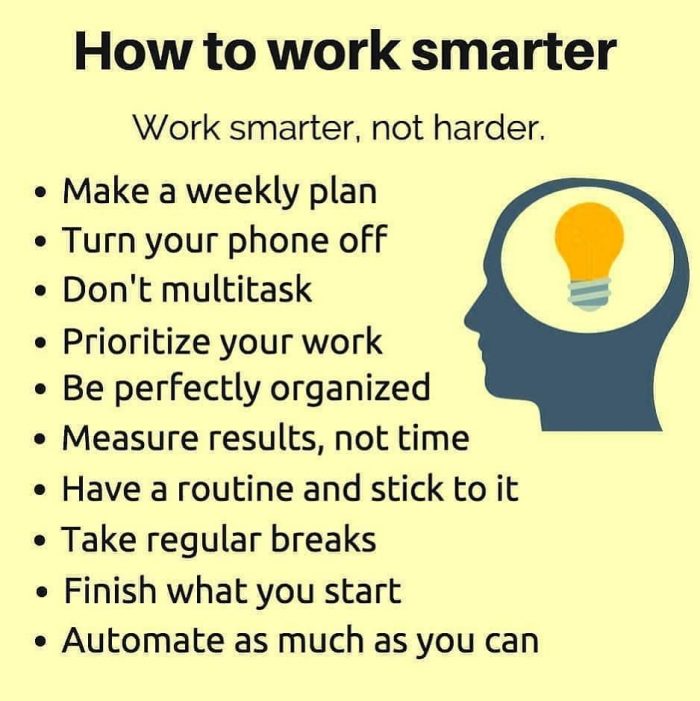
There’s a lot of advice out there about how to be more productive. Some say that you need to work harder, some say that you should plan your day and make sure you get things done on time, and others talk about the importance of prioritising tasks. And while these are all very valid points, I think there are also lots of things we can do that don’t require us to exert any extra effort at all—they just help us use our existing energy more efficiently. In other words: working smarter not harder! So here’s my list of 10 brilliant ways to improve your productivity without having to put in any extra work:
Make a weekly plan
Prioritise your tasks and organise your time, space and thoughts. Prioritise your work, life and health.
Turn your phone off
The first thing you can do is turn off the notifications on your phone. You’ll still be able to receive calls and texts from friends, family, and coworkers if they need you urgently. But you can avoid the urge to constantly check for new emails or Facebook messages by simply turning off all of those notifications. Turning off your phone when it’s not in use is another great way to avoid wasting time scrolling through social media or playing games on your phone—or worse yet, using it as a distraction from what really needs to get done! Setting a time limit for checking your phone may also help keep yourself focused.
Don’t multitask
The myth of multitasking is a real thing. Yes, you might get more things done in the short-term. But what happens when your brain starts to feel exhausted by all the switching? And what happens when you start losing focus on any one task? Like many myths, this one can be hard to shake because it’s so deeply ingrained in how we live. It’s time we start looking at our habits differently and asking ourselves: Is multitasking really worth it? It isn’t! When I think back on my own productivity over the past few months, I’ve found that working without distractions has helped me achieve great results for both work and play.
Prioritise your work
One of the most important things you can do to work smarter, not harder is to prioritize your work. Prioritizing your work by importance, urgency and frequency is a great way to get a handle on what needs attention first. But if you want to make sure that all your tasks are completed effectively and efficiently (and don’t have nagging doubts about them) then there are other ways of prioritizing too. You could give each task a score out of 10 for how much enjoyment it will bring or how much money it will bring in – whichever is most important to you at the time!
Be perfectly organised
Organise your workspace and organise your time. Organise your thoughts and your files. Organise your calendar and to-do list, if you use a software one (Evernote is awesome for this).
Measure results not time
When you measure results instead of time, you are more likely to switch things up when they’re not working. For example, if you’re working on a project and it’s not progressing as quickly as you hoped, then stop working on that project and try something else. Also, when something is working well and progressing at a good pace, don’t change it just because it may be taking up too much time. As long as the quality of work is high and the deliverables are being met successfully, then keep doing what works well for now until there’s an opportunity for improvement or better results can be had by changing course.
Have a routine and stick to it
Having a routine is essential to working smarter, not harder. A routine helps you get more done during the day and lessens your stress levels by establishing what you need to do on a daily basis. Think about how long each task takes (or should take) in order for it not to interfere with other work responsibilities or personal obligations such as spending time with family members or exercising regularly. If necessary, adjust times accordingly so that everything fits within an appropriate timeframe without going over budget on resources like electricity bills due to lack thereof planning ahead ahead ahead ahead ahead
Take regular breaks
Taking breaks is essential for your productivity. It gives you the chance to recharge and refresh, so that when you return to work, you’re more focused than before.
Finish what you start
Here’s the deal: when you don’t finish what you start, you’re wasting time. And if there’s one thing that can be said about time, it’s that it waits for no man. When we don’t finish what we begin, our lives become cluttered with unfinished tasks. This clutter leaves us feeling overwhelmed and stressed out because we know there are things out there demanding completion but they aren’t getting done (or even started). When everything is left to languish on the back burner like that—and nothing ever gets done—we end up feeling guilty and depressed; feeling as though we’re not good enough simply because our lives consist largely of failed attempts at getting ahead.
Automate as much as you can
Use a calendar to keep track of your time. Create a to-do list and use it religiously, checking off each task once you’ve completed it, so that the rest of the items on your list stay at the top in order of importance, rather than being shuffled around by new tasks being added daily or weekly (or even hourly). To-do lists are also helpful for seeing what can be delegated, and determining whether a given task is worth doing at all.
With these tips, you can be more efficient in your work and get things done faster. You’ll have more time to do the things you love, whether that’s watching Netflix or going for a run.
